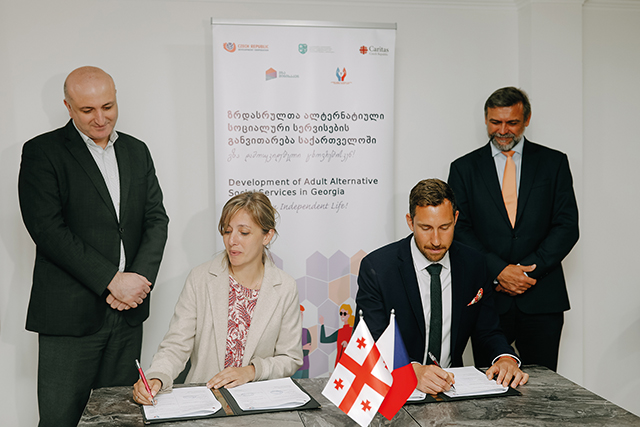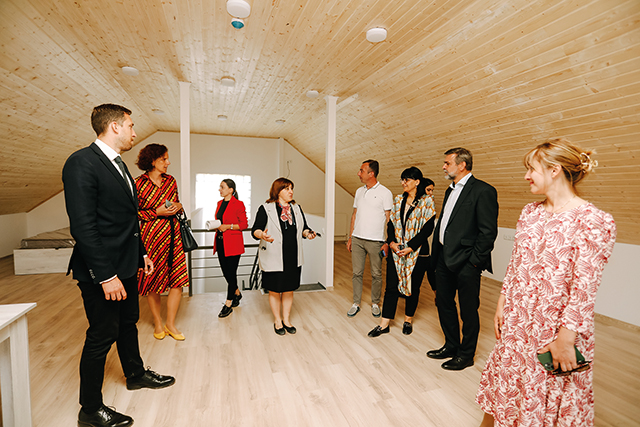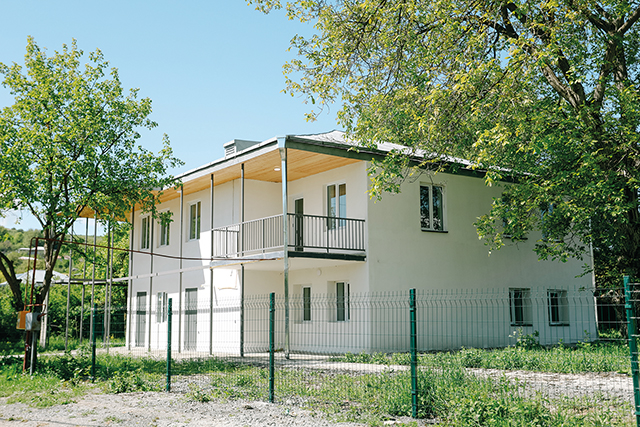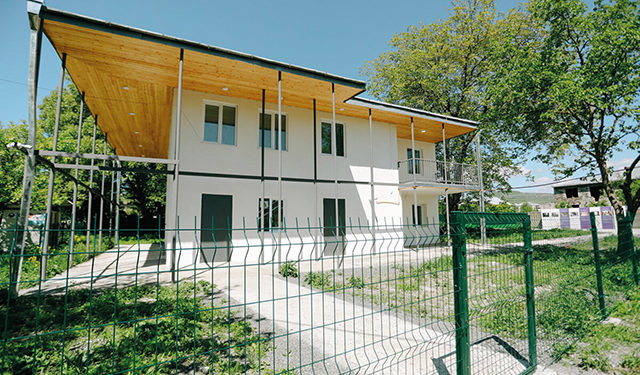Caritas Czech Republic has been addressing the disability issue since its mission’s establishment in Georgia. In 2020, our organization launched four-year project that aims to contribute to the deinstitutionalization of large boarding institutions by supporting the Government of Georgia with various legislative initiatives and helping persons with disabilities (PwDs) in starting an independent life.
One of the main successes of the project so far was the handover of two family-type homes to the State Care Agency that are intended for setting up small residential services for the beneficiaries currently living in large boarding homes. In the following year and half, additional four houses will be completed and given to State Care Agency.

Within the framework of the Czech Development Agency-funded project „Way to Home: Development of Adult Alternative Social Services in Georgia“, Caritas Czech Republic handed over two family-type homes to the Agency for State Care and Assistance for the Victims of Human Trafficking. The procurement, rehabilitation and handover of these houses is a part of Caritas Czech Republic’s contribution to the deinstitutionalization process in Georgia meaning the provision of the relevant legislative initiatives as well as community-based homes and services for persons with disabilities (PwDs) living under the state care.
Petr Mikyska, Ambassador of the Czech Republic to Georgia, who participated in the houses handover ceremony, noted that supporting vulnerable and marginalized groups is one of the main priorities of the Czech Development Cooperation to support in Georgia:
“It is the directive of the OECD efforts, of Council of Europe recommendations, it is the part of the commitments of the governments, and I am happy that we are fulfilling these commitments as well. Now we are witnessing the handover of two houses to the State Care Agency. I am very impressed with how fast the construction process went and with the quality of the results. Thus, congratulations to Caritas Czech Republic’s team for this good work and I am sure next time I will be happy to see the beneficiaries living here integrated into the society.”

Although the deinstitutionalization process in Georgia began in 2010-2011, it is still an ongoing process due to its complexity. In 2020, Caritas Czech Republic’s experts in the field, in close cooperation with Czech colleagues and project partners, identified the main areas of work, assessed the needs and interests of the beneficiaries. Afterward, our team of experts worked on the deinstitutionalization strategy and an action plan to support the Government of Georgia aiming to help the beneficiaries to start independent living in new services.
Meri Maglaperidze, Director of State Care Agency notes that the deinstitutionalization process is as a part of the State Care Agency’s social politics in which Caritas Czech Republic contributed a lot:
“House handovers are a very important stage of the project as well as the prior preparation works, including working on the deinstitutionalization strategy and an action plan as well as assessment of the beneficiaries and their preparation for an individual living. With the financial support of the Czech Development Agency, now the beneficiaries can live in family-type homes and make independent decisions”.
Within the framework of the project, eventually, the lives of 112 adult persons with disabilities will be changed – stepwise, according to their individual needs and will.

Tamila Barkalaia, Deputy Minister of Health of Georgia expressed her gratitude to the Official Development Assistance of Czech Republic:
“Caritas Czech Republic and the Government of Georgia have been partnering for years and carried out important projects in support of Georgia’s social protection and healthcare. This project is very important as there are two large boarding houses left in Georgia that should be closed, and alternative social services must be offered to the beneficiaries living there. I would like to express my gratitude to the Czech Development Cooperation and Caritas Czech Republic for the rehabilitation and handover of family-type homes to the state for the people with disabilities currently living in large boarding houses”.
Disability Issue is One of the Flagships of Caritas Czech Republic’s Work
Since 2015, Caritas Czech Republic has been supporting the efforts of Government of Georgia to reform the social protection and healthcare systems. Thus, the implementation of the Czech Development Agency-funded project is a part of Caritas Czech Republic’s broader contribution to the improvement of the country’s social care system.
In 2017-2021, with the financial support of the Czech Development Agency (CzechAid), Caritas Czech Republic worked on the development of the long-term care (LTC) services for children in need of palliative care assistance. Except for direct beneficiaries, the project targeted policymakers, NGOs and experts working in this sector. Within the framework of the initiative, project experts worked on the legal framework for LTC (concept papers, operational standards, review of relevant legislation, licensing conditions) and capacity-building of professional staff to establish new children’s LTC center at Zhvania Children’s hospital of Tbilisi State Medical University (TSMU). The second component of the project included the renovation and equipping of a multi-sensory room Snoezelen at the Children’s hospice where at least 25 beneficiaries receive therapies annually.
In 2019-2021, another very important project was carried out thanks to the financial support from the Czech Development Agency (CzechAid), aiming at expanding and improving the services for people with ASD, as well as professional strengthening of specialists working in the field. Our organization carried out activities with a total budget of up to 255 000 Euros, in close cooperation with Ilia State University’s Child Development Institute and the Georgian Academy of Childhood Disability. The project was elaborated together with the Ministry of Health of Georgia, considering the priorities of the Government of Georgia in the mentioned sector.
This material was prepared in the scope of the project financed within the Official Development Assistance of the Czech Republic and implemented through the partnership between Czech Development Agency and Caritas Czech Republic.
By Nina Kopaleishvili
















